Want Smoother Gameplay? Here Are the Best 4 DNS for Gaming
If you’ve ever found yourself screaming at the screen because of lag or sudden spikes in latency, you’re one of the many gamers struggling with connection speed swings. With the rise of competitive online gaming, finding the best DNS for gaming has become a hot topic. Your DNS can act like a speedy translator, directing your data to the right servers faster while helping you get into matches quicker, reduce ping, and smooth out those annoying jitters you experience mid-game. In this article, we’ll explore how DNS works, why it matters for gamers, and which providers reign supreme in this arena.

What is DNS and how it works
DNS stands for Domain Name System. It’s like the Internet’s phonebook. When you type a website into your browser, DNS finds the corresponding IP address and connects you to the right server. Without DNS you’d have to memorize long strings of numbers just to visit your favorite sites, or in our case, jump into your favorite games.
For gamers, the role of DNS goes beyond just convenience. A fast, reliable DNS service directs your data where it needs to go as fast as possible. The faster your computer or console can resolve those server addresses, the sooner you can start a match and the smoother the gaming experience will be. If your DNS is slow or flaky, you might see stuttering, lag or random disconnects that can be game over, especially during competitive play. But if you choose an optimized DNS provider, you can shave milliseconds off your connections and enjoy a more stable online environment.
Why DNS matters for gaming
When every millisecond counts, having a speedy and reliable DNS can be a game-changer literally. When you send data back and forth to a game server, DNS helps figure out where that server is located. If this process takes too long, you’ll experience higher ping times, which lead to lag and delayed responses in-game. During heated matches, just a small delay can mean the difference between victory and defeat.
Picking a solid DNS can help minimize these delays and provide a more consistent connection. Instead of dealing with random ping spikes or packet losses, you’ll get smoother movement, faster match loading, and a generally more stable experience. It’s not a magic cure for all lag issues (sometimes server distance or Internet congestion can prolong so-called DNS queries), but picking the fastest DNS for gaming is one of the easiest and most effective ways to give your gameplay a boost.
Top DNS servers for gaming
When it comes to finding the best DNS server for gaming, a few stand out for speed and reliability. Here are the fastest DNS servers for gamers that gamers swear by:
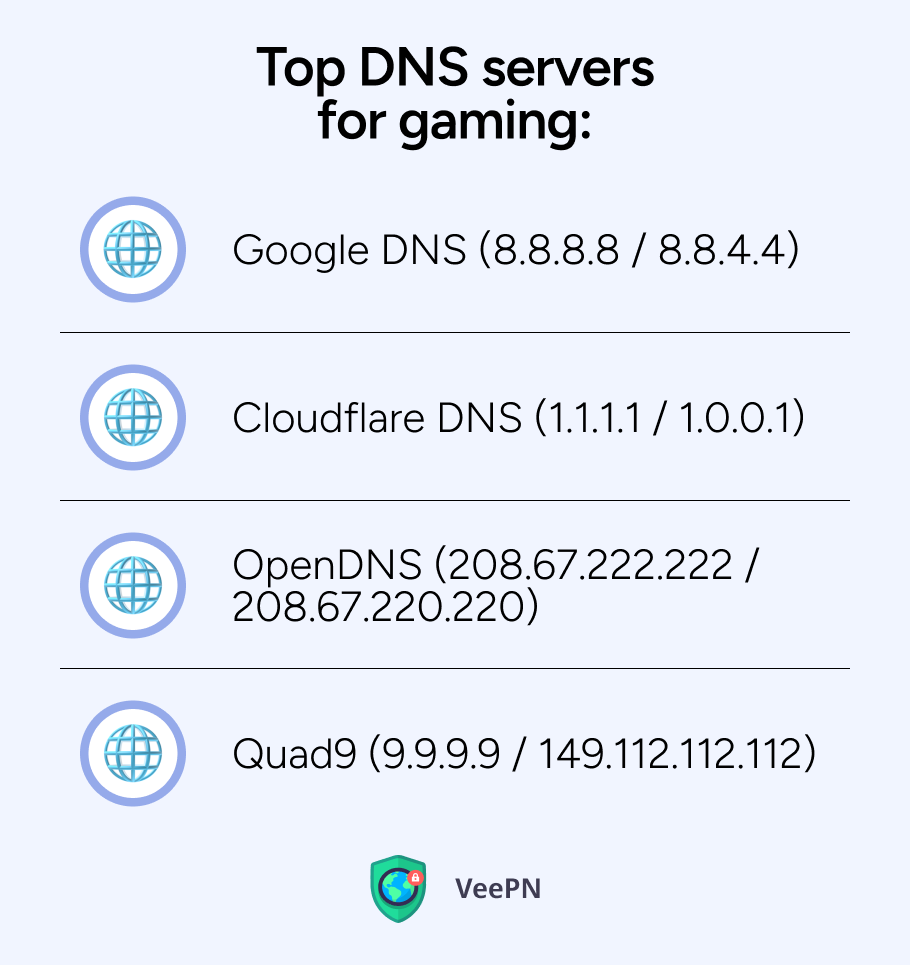
- Google DNS (8.8.8.8 / 8.8.4.4). Global reach and fast response times. Google public DNS massive infrastructure delivers quick lookups almost anywhere. Simple and reliable.
- Cloudflare DNS (1.1.1.1 / 1.0.0.1). One of the best DNSs to reduce ping. Cloudflare’s DNS is often one of the fastest globally and reduces ping and latency for online gaming. Plus, they don’t store much of your browsing data.
- OpenDNS (208.67.222.222 / 208.67.220.220). Stable and secure. If you want a DNS that never lets down, this might be the one. Also has optional filtering tools for family-friendly networks.
- Quad9 (9.9.9.9 / 149.112.112.112). Best DNS for low latency. Like other big providers, it’s generally quick and stable. A good option if you want to be safe online without sacrificing speed.
Finding the “best” one often depends on where you live and what kind of connection you have, so different DNS servers may have their own benefits depending on your location or other factors. Pick one and compare it to other DNS servers to decide whether it’s a good fit. Once you find a winner, you’ll notice fewer hiccups and quicker matchmaking.
Step-by-step DNS setup guide for your platform
Below are simple, step-by-step instructions on how to change your DNS settings on Windows, macOS, PlayStation, and Xbox. By customizing these settings, you can quickly test which DNS provides the best performance for your online games.
Windows
- Open network settings. Right-click on the network icon in your taskbar (usually located in the bottom-right corner) and select Network & Internet settings.
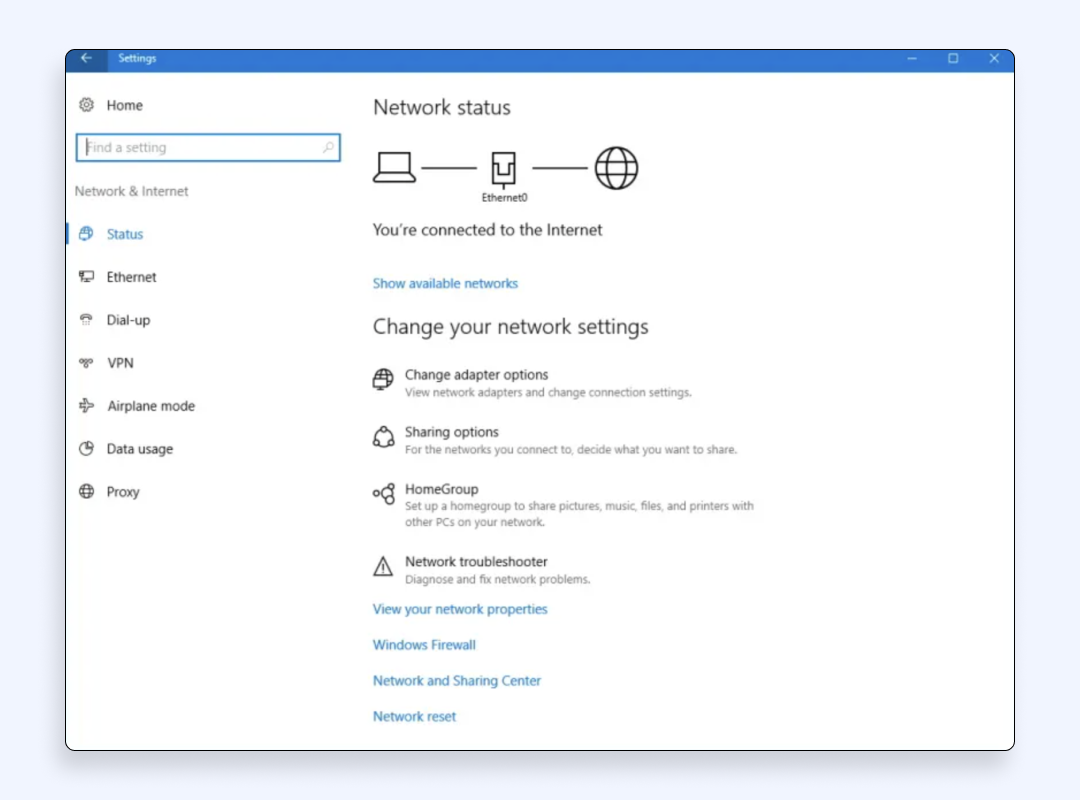
2. Access adapter options. In the Settings window, click Change adapter options.
3. Select your connection. Right-click on the network connection you use and choose Properties.
4Open IPv4 properties. Scroll down and highlight Internet Protocol Version 4 (TCP/IPv4), then click Properties.

- Enter your preferred DNS. Select Use the following DNS server addresses, then type in your chosen DNS addresses.

6. Confirm and save. Click OK to save your changes, then restart your PC or briefly disconnect and recon. Connect to your network for good measure.
MacOS
- Go to System Settings. Click the Apple menu in the top-left corner, then choose System Settings.
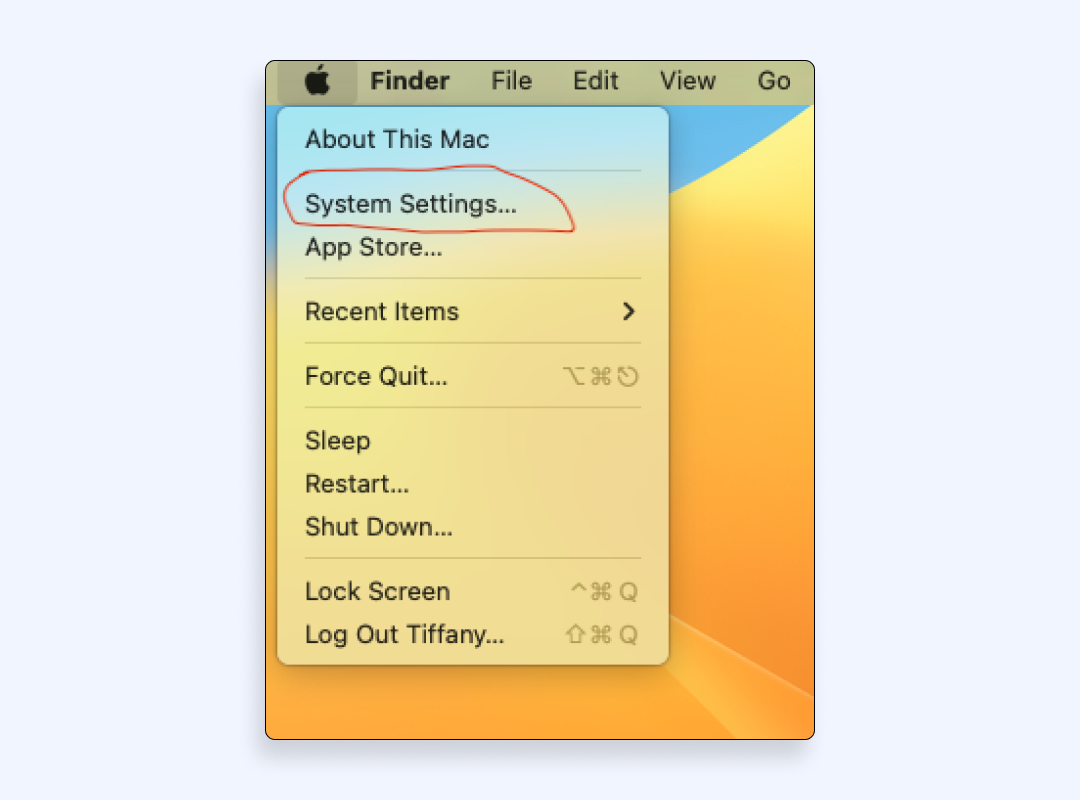
2. Open Network settings. Select Network from the left-side menu.

3. Choose your active network. Highlight the network you’re currently using, typically WiFi or Ethernet.
4. Access DNS settings. Click on Details, then go to the DNS tab.
5.Add new DNS servers. Press the + button to add your preferred DNS servers.
6.Apply changes. Click OK, then Apply to confirm. Your Mac may momentarily disconnect and reconnect to apply the new DNS.

Playstation (PS4/PS5)
To set up your best DNS for PS4/PS5, do the following:
- Open Settings. From the home screen, go to Settings at the top-right of the main menu.

2. Select Network. Choose Network, then Set Up Internet Connection.
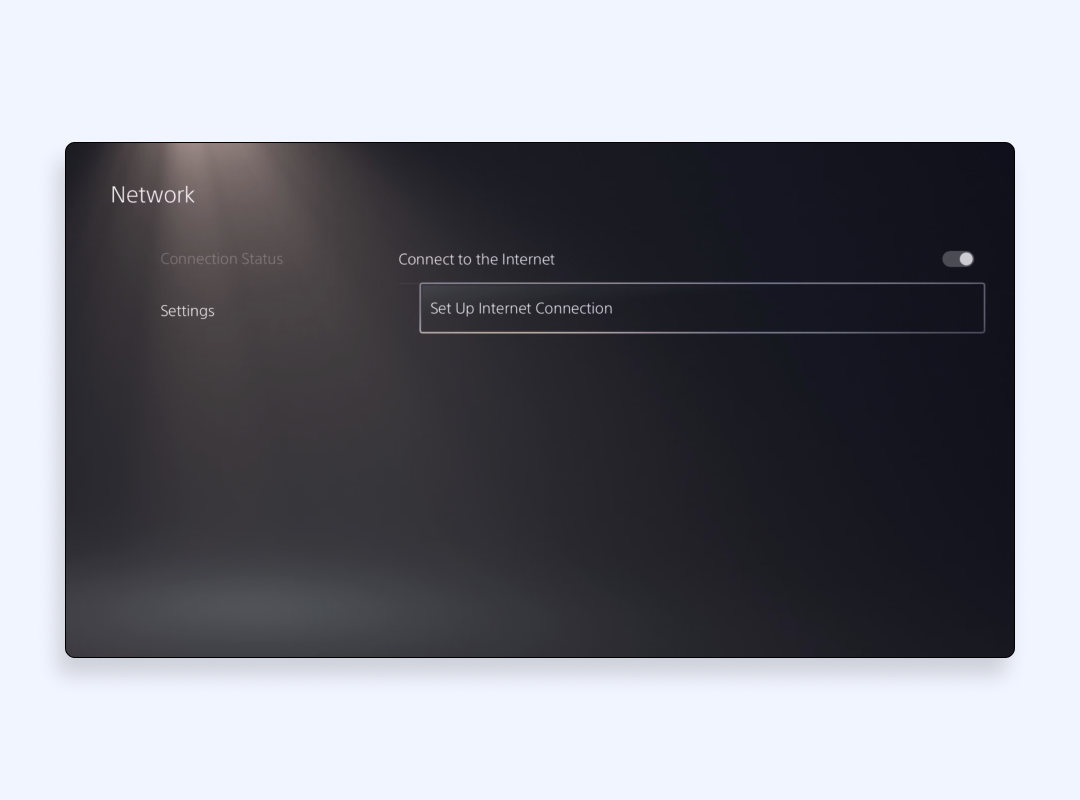
- Choose connection type. Pick Use WiFi or Use a LAN Cable, depending on your setup.
- Advanced Settings. Go back to the Set Up Internet Connection page and click on Advanced Settings.

3. DNS Settings. Choose Manual, then enter your Primary DNS and Secondary DNS. Once you enter new DNS server addresses, you’re ready to proceed.
4. Proxy Server. Select Do Not Use.
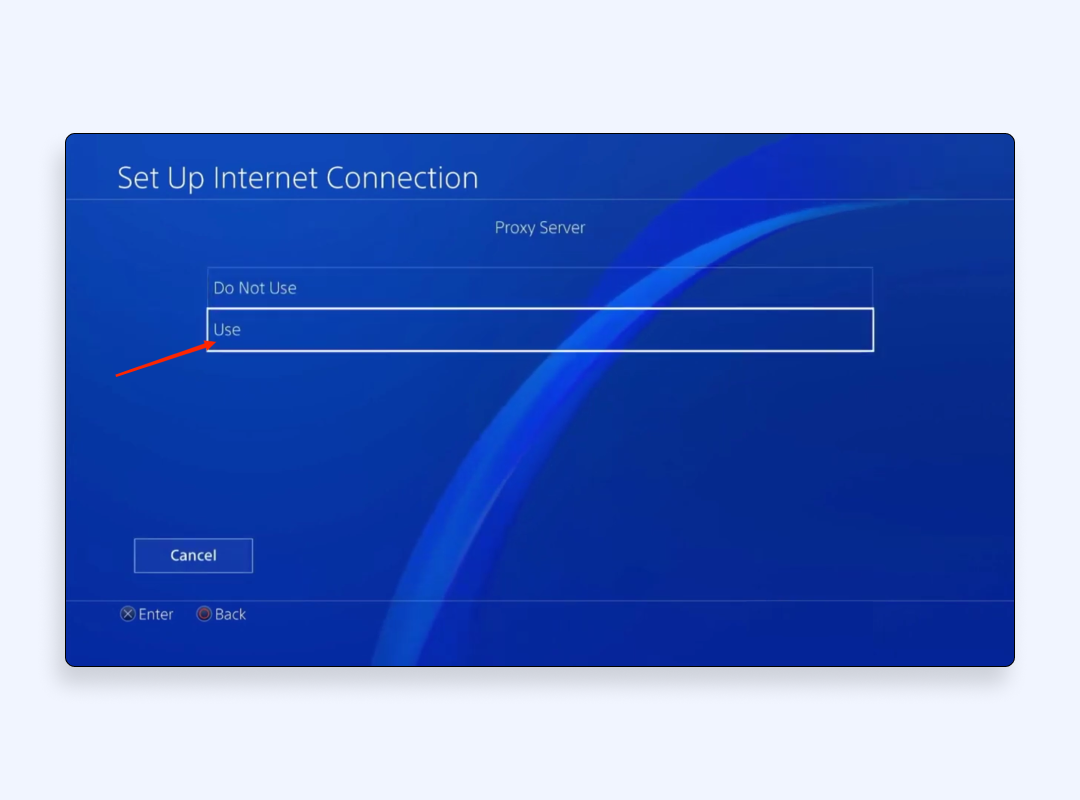
5. Test Connection. Once the setup is complete, your PlayStation will run a test to confirm the DNS changes.
Xbox (Xbox One/Series X|S)
- Go to Settings. From the Home screen, press the Xbox button on your controller, then choose Profile & system and select Settings.

- Open Network settings. Navigate to General, then click on Network settings.
- Advanced settings. Select Advanced settings to see your current network configuration.
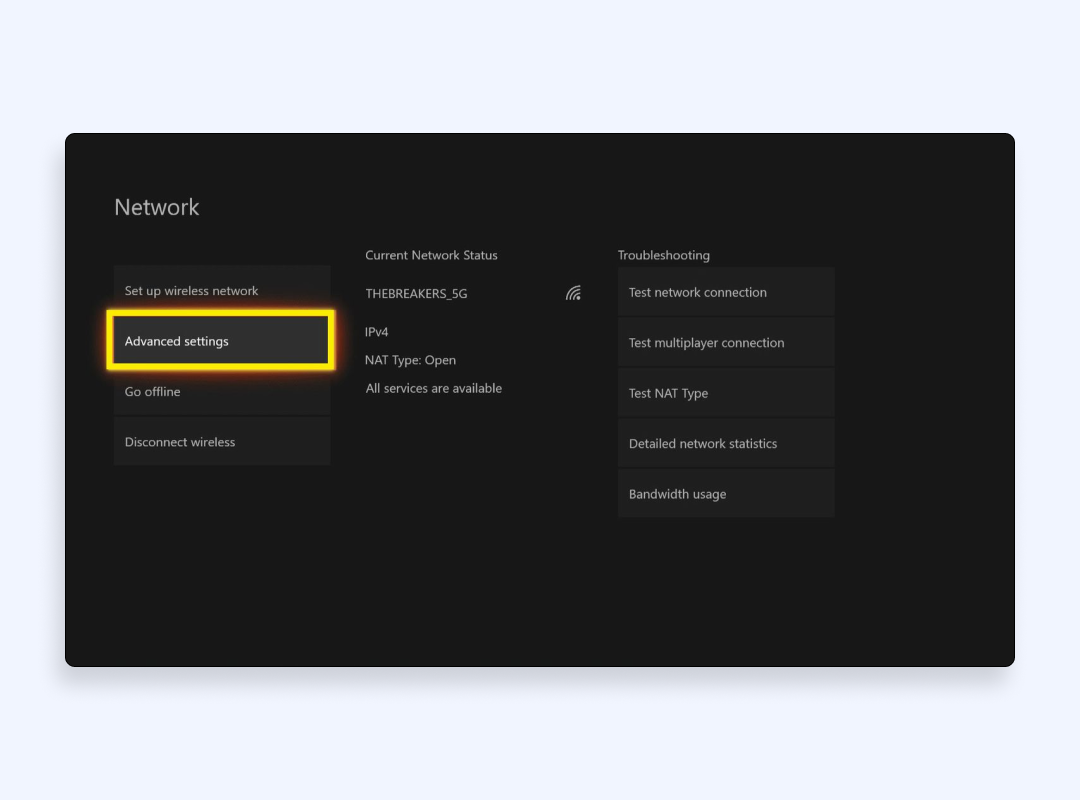
- DNS settings. Choose DNS settings, then switch from Automatic to Manual.
- Enter DNS addresses. Type in your Preferred DNS and your Alternate DNS.
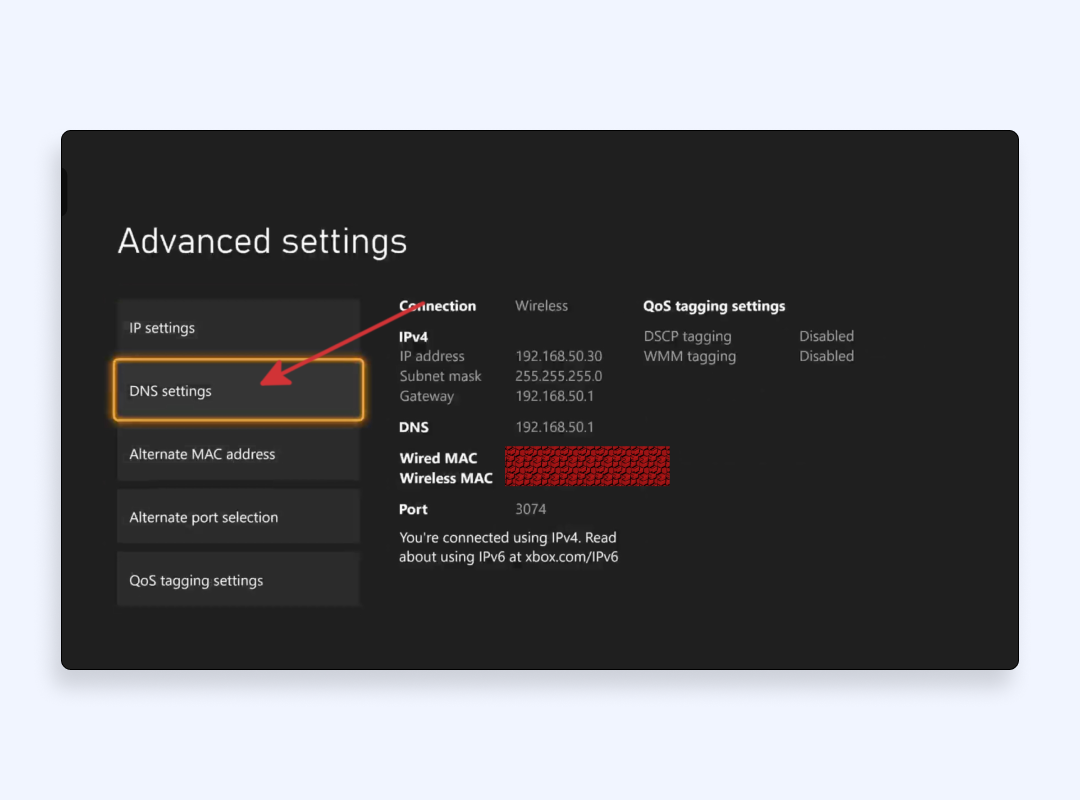
- Confirm and restart. Press B on your controller to go back, saving your changes when prompted. Restart your console or refresh your connection to ensure the new DNS is active.
If you follow these steps, you can easily swap between various DNS providers to see which one delivers the best results. If you experience any hiccups, simply switch back to Automatic DNS or try another provider until you find the smoothest gaming experience. Enjoy the lower ping and quicker matchmaking!
Additional tips for reducing lag
Choosing the best DNS for gaming is a big step toward smoother online matches, but it’s only part of the puzzle. Here are a few more ways you can fine-tune your setup to minimize lag and keep your gameplay as seamless as possible:
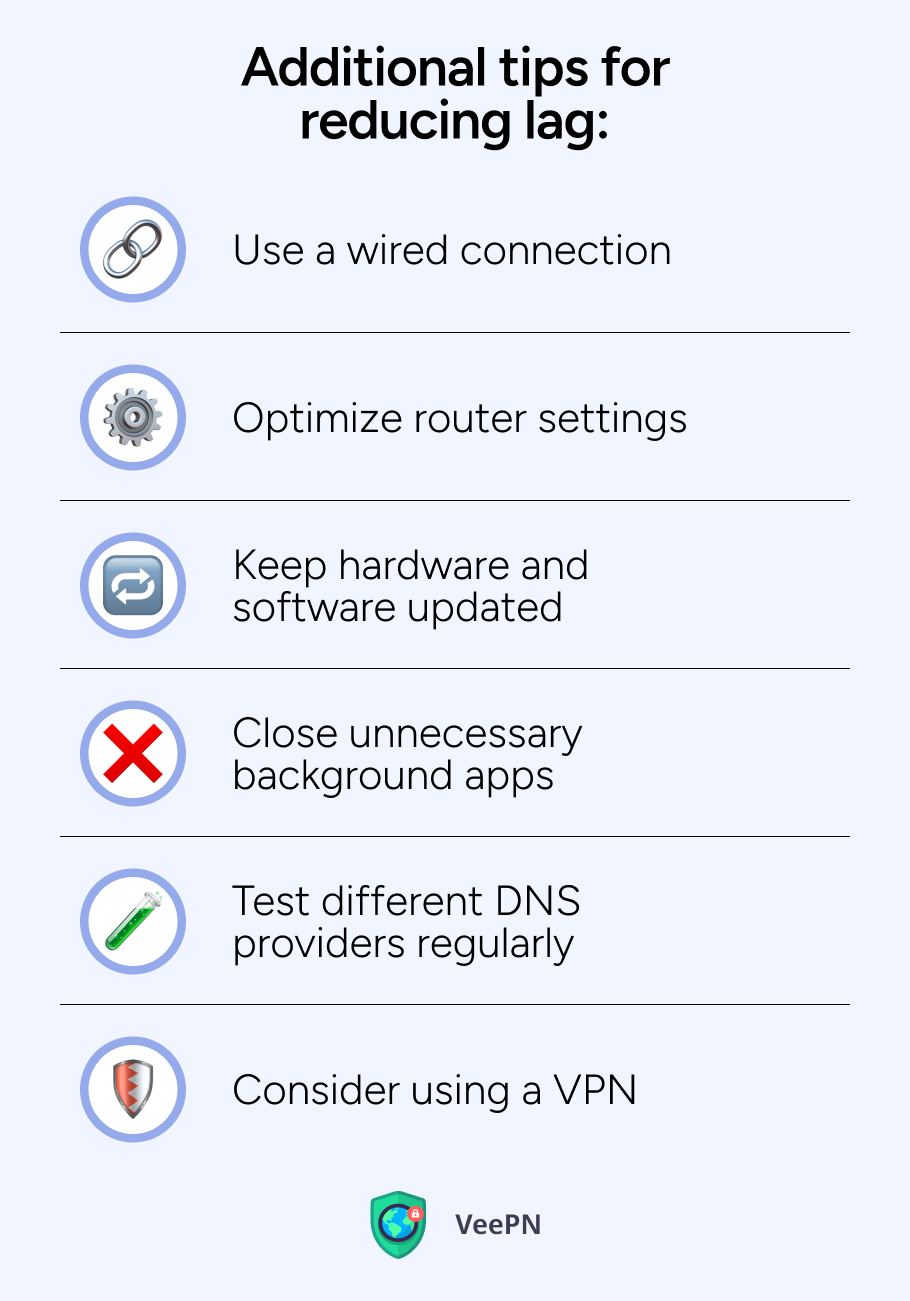
- Use a wired connection. Whenever possible, opt for an Ethernet cable instead of WiFi. A direct wired connection is usually more stable and delivers lower latency, which can be critical when every millisecond counts.
- Optimize router settings. Many modern routers have Quality of Service (QoS) features that let you prioritize gaming traffic. By giving priority to your console or gaming PC, you can help ensure other devices (like phones streaming videos) don’t hog your bandwidth.
- Keep hardware and software updated. Outdated firmware or drivers can slow down your Internet connection and introduce unnecessary issues. Keep your router, operating system, and network drivers up to date for the best performance.
- Close unnecessary background apps. If you’ve got a dozen applications running in the background, they might be competing for bandwidth. Close or pause any downloads and streaming apps before you hop into an online match.
- Test different DNS providers regularly. The best DNS today might not be the best tomorrow, especially if you move or switch Internet providers. It’s worth checking your performance from time to time and experimenting with new DNS options for optimal results.
- Consider using a VPN. A gaming-optimized VPN uses dedicated servers to improve your connection stability depending on specific conditions, even though it might come with a little latency. When your Internet Service Provider (ISP) reduces gaming speed or forces you through overloaded server routes, a good VPN may come in handy. VPNs encrypt your connection and redirect your traffic to provide you with stable server access while bypassing congested network points.
However, we recommend avoiding free VPNs because they commonly lack enough servers to provide you with truly high connection speeds. Switch to VeePN instead because it guarantees uninterrupted gaming access and advanced security features. How? Let’s discuss in more detail!
Why VeePN is a good option
When it comes to taking your gaming experience to the next level, VeePN offers features designed with gamers in mind:
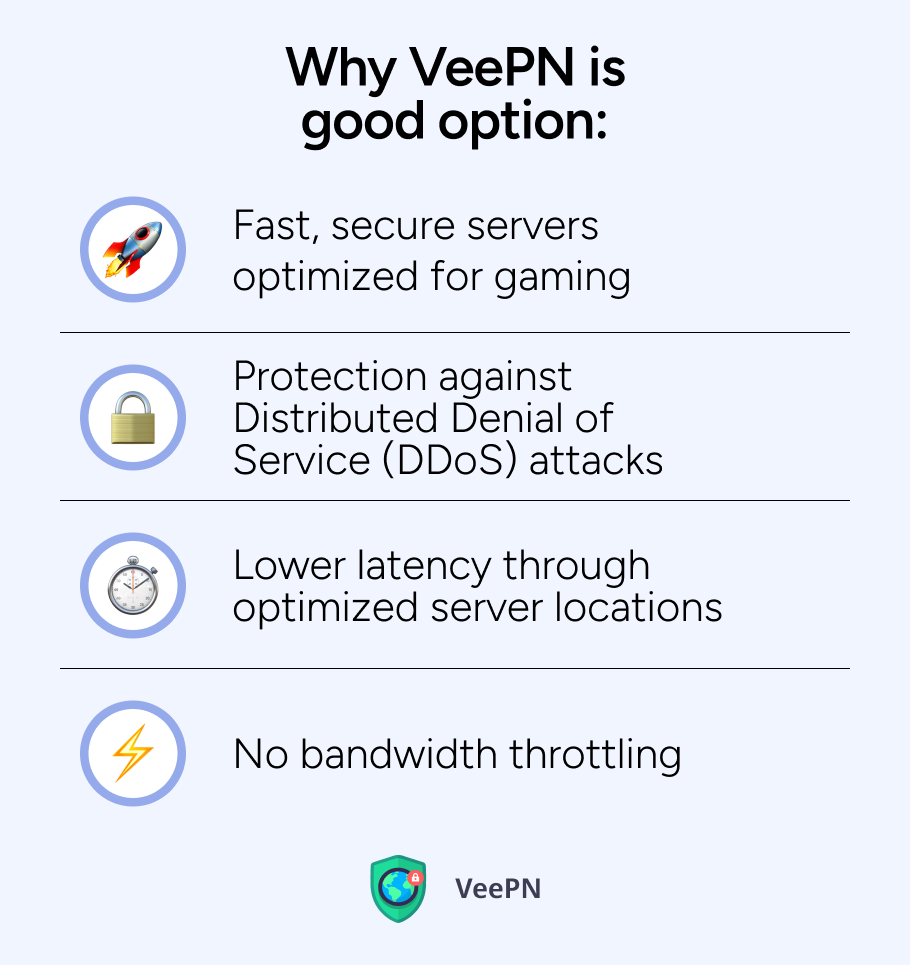
- Fast, secure servers optimized for gaming. The VeePN servers run at high speeds, so your gaming traffic won’t slow down as we have 2,500+ servers in 89 locations to ensure our users don’t face traffic congestion problems.
- Protection against Distributed Denial of Service (DDoS) attacks. Such attacks can disable your connection, so you get disconnected from the game. With VeePN, your traffic is encrypted with a military-grade protocol, so nobody can get unauthorized control over your gaming device and use it as a bot for the attack.
- Lower latency through optimized server locations. VeePN can automatically connect you to the server that is closest to you, so you’ll get the highest connection speed in your current location.
- No bandwidth throttling. Once your traffic goes encrypted and goes through a remote server, you can prevent tracking by your ISP that may throttle your speeds during gaming sessions. In such a way, you can enjoy fast-connection gaming without any interruptions.
Compatible with PlayStation, Xbox, and PC, VeePN can be your go-to solution for fast and secure gaming. Download VeePN now and enjoy a 30-day money-back guarantee!
FAQ
Both 1.1.1.1 and 8.8.8.8 are perfect DNS servers for gaming, but there can be differences in performance depending on your location. We recommend testing both servers to decide which one suits you best.
DNS primarily affects how quickly a game (or any other application) can resolve server addresses when you first connect or when the server’s IP changes. Once you’ve connected, the actual data flow (latency and throughput) isn’t really governed by DNS. So while a faster DNS can shorten initial load times slightly, it typically doesn’t have a major impact on in-game performance once you’re already playing.
VeePN’s DNS servers enhance gaming by reducing latency and improving connection stability, which leads to smoother, lag-free gameplay. They also help block malicious sites and prevent DNS-level tracking, boosting both performance and online security.
VeePN is freedom
Download VeePN Client for All Platforms
Enjoy a smooth VPN experience anywhere, anytime. No matter the device you have — phone or laptop, tablet or router — VeePN’s next-gen data protection and ultra-fast speeds will cover all of them.
Download for PC Download for Mac IOS and Android App
IOS and Android App
Want secure browsing while reading this?
See the difference for yourself - Try VeePN PRO for 3-days for $1, no risk, no pressure.
Start My $1 TrialThen VeePN PRO 1-year plan








